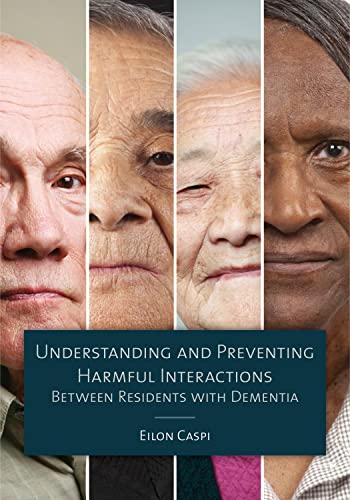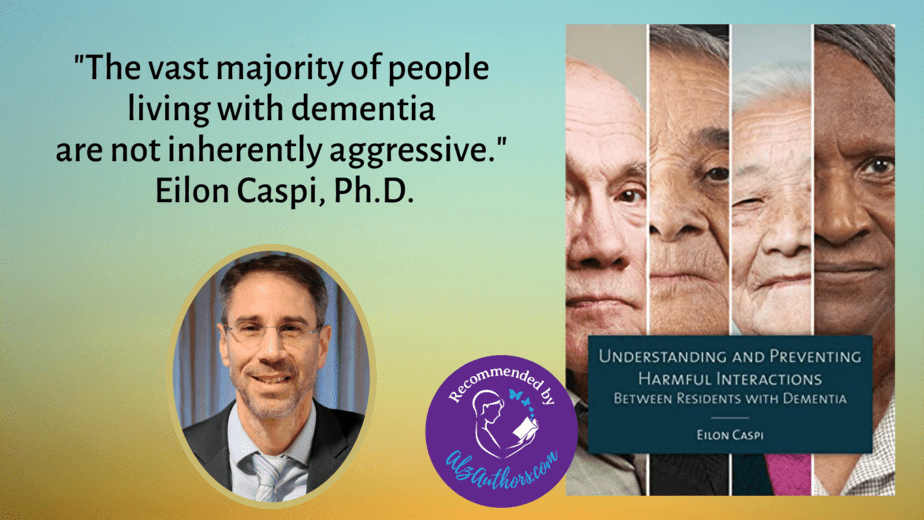By Eilon Caspi, Ph.D.
I started working in the aging field in 1994 as a nurse aide in a nursing home where my grandfather lived. I then worked as a social worker with low income older adults in the community and a nursing home. Both my grandmothers had dementia.
These early experiences planted the seeds for my work and research related to people living with dementia. Enabling these individuals to live outside the stigma and receive dignified and safe care – and to flourish emotionally and psychologically despite living with a cognitive disability – has been a central goal of my work, research, and advocacy over the years.
In this article, I will address one of the most important but largely overlooked misconceptions about this population.
Myths about dementia and aggression
For decades, we’ve been told that older adults living with Alzheimer’s disease and other forms of dementia are “aggressive,” “violent,” and “abusive.” We’ve become accustomed to reading about it in the media, research studies, and government and policy reports, and hearing about it in presentations delivered at professional and scientific conferences.
Despite being inaccurate all along, this narrative has rarely been called into question.
These common and labeling terms are not only inaccurate in most situations related to this population (certainly in most situations related to the vast majority of older adults in the mid-to-late stages of Alzheimer’s disease) but they can also be harmful and traumatic for these individuals. Such harm often occurs due to lack of understanding, recognition, and proactive fulfilment of their varied human needs as well as due to the common but often inappropriate and dangerous use of antipsychotic medications.
Yes, the consequences of these human expressions can be psychologically and physically harmful to others (including physical injuries or worse). But as much as it is difficult to experience them in the heat of the moment (including scary situations), this fact shouldn’t automatically constitute these human expressions as aggressive and violent. For too long, we, care professionals and researchers, have been too quick to judge and label this population using these stigmatizing terms. In doing so, we’ve inadvertently done disservice to older adults living with dementia and those who care for them.
The real but rarely told story is that these people are living with a serious cognitive disability due to a brain disease, and that they are doing their best – using their remaining cognitive and other abilities – to cope with situations that are often very frustrating, distressing, upsetting, and frightening to them.
Unmet needs
In most situations, with careful observation, one can see that the main reasons for these human expressions have to do with the fact that the emotional and other human needs of these individuals are not being met by well-meaning but often physically and emotionally exhausted and largely unsupported people who care for them. These dedicated and compassionate family and paid care partners often provide care to older adults with dementia with limited resources and lack of evidence-based education, guidance, and emotional support.
When looking closely, one can often see how situational frustrations, interpersonal misunderstanding, fear, soul crushing boredom and lack of personally meaningful engagement, distressing factors in the social and physical environment (such as noise, glare, and other non dementia-friendly features), untreated physical pain, and sleep problems intersect with the person’s cognitive disabilities, resulting in these human reactions.
In most interactions labeled as “aggressive,” one can see – during the minutes or hour(s) prior to the interaction – that the dignity of the person is perceived by the individual as being threatened in some way. Dignity is defined as “the quality or state of being worthy, honored, or esteemed” (Merriam-Webster dictionary). In these situations, certain individuals with dementia may respond in ways that could be perceived by others as aggressive. They may become very frustrated and angry and they may curse, grab, push, or strike another person around them.
As much as these responses can emotionally and physically hurt others, we need to look at the whole situation critically in its full context and ask ourselves: Is the person truly aggressive?
After focusing on the largely mislabeled phenomenon of “aggressive behaviors” among people living with dementia over the past 15 years in my work, consulting, and applied research, I know that only very rarely does a person living with dementia wake up in the morning with a premeditated intent to be aggressive, violent, and injure another person.
Yes, a very small subgroup of individuals living with early stages of dementia may engage in behavioral expressions that could accurately be characterized as aggressive. For example, some people have lifelong aggressive and even violent tendencies which may continue or even exacerbate after their dementia onset.
But the vast majority of people living with dementia are not inherently aggressive.
Dispelling this myth
 This is the main motivation and message in my new book on the prevention of distressing and harmful interactions between people with dementia in long-term care homes, Understanding and Preventing Harmful Interactions Between Residents with Dementia.
This is the main motivation and message in my new book on the prevention of distressing and harmful interactions between people with dementia in long-term care homes, Understanding and Preventing Harmful Interactions Between Residents with Dementia.
Information about the book can be found on Health Professions Press website and can be purchased on Amazon.
It is also the main message of a documentary film my colleague Judy Berry and I co-directed, “Fighting for Dignity.” The goal of the film is to recognize the emotional impact experienced by family members of residents harmed during these resident-to-resident episodes. Information about the film can be found on the Terra Nova Films website.
In closing, several pioneers and giants in our field including Naomi Feil (founder, Validation Method), Tom Kitwood (Bradford Dementia Group), Paul Raia (developer, Habilitation Therapy), Allen Power (consultant and educator), Judy Berry (Dementia Specialist Consulting), Jayne Clairmont (Dementia expert and consultant), and Teepa Snow (Positive Approach to Care) – must be recognized for their foundational contributions towards realizing this long-awaited paradigm shift.
Standing on the shoulders of these giants and informed by my own and others’ research on these commonly misunderstood “behaviors,” my hope is that this article will encourage those who support and care for people living with dementia to see these individuals and their human expressions in a new light, one that shifts towards a more balanced, humane, and stigma-free narrative.
About Eilon Caspi, PhD
 Eilon Caspi, Ph.D. is a gerontologist and an assistant research professor at the University of Connecticut. He is the founder and director of Dementia Behavior Consulting LLC and a founding member and board member of Elder Voice Family Advocates. He also serves on the board of the Long Term Care Community Coalition. He started working in the aging field in 1994 as a nurse aide in a nursing home where his grandfather lived in Israel. Since then, he worked as a social worker, consultant, applied researcher, educator, author, documentary film director, and elder care advocate. His research focuses on the prevention of abuse, neglect, resident-to-resident incidents, financial exploitation, and theft of opioid pain medications in long-term care homes. His passion is in bridging between research and care practice. In his free time, he enjoys carving wood and recently carved several brain hemispheres and educational signs such as SEE ME Not My Dementia, Elder Voice, and Justice for Elders.
Eilon Caspi, Ph.D. is a gerontologist and an assistant research professor at the University of Connecticut. He is the founder and director of Dementia Behavior Consulting LLC and a founding member and board member of Elder Voice Family Advocates. He also serves on the board of the Long Term Care Community Coalition. He started working in the aging field in 1994 as a nurse aide in a nursing home where his grandfather lived in Israel. Since then, he worked as a social worker, consultant, applied researcher, educator, author, documentary film director, and elder care advocate. His research focuses on the prevention of abuse, neglect, resident-to-resident incidents, financial exploitation, and theft of opioid pain medications in long-term care homes. His passion is in bridging between research and care practice. In his free time, he enjoys carving wood and recently carved several brain hemispheres and educational signs such as SEE ME Not My Dementia, Elder Voice, and Justice for Elders.
Connect with Dr. Caspi



4 Responses
Thank you for bringing these realities to light, Dr. Caspi. In my experience, many people living with dementia are definitely frustrated with their own condition, and it’s our responsibility to listen deeply, provide engaging environments, and double check if any medication side effects might be affecting a person’s behavior. When I regard people with respect and care, and creative expression like music, storytelling, and art creating, people feel more relaxed and connected, and feel better, which makes achieving daily tasks more successful with more trust between us. Your book is incredibly valuable to the field and the future of person-centered care. Thank you.
Thank you, Tryn. Marianne
Tryn,
Thank you for your kind note. I couldn’t agree more. Engagement in personally tailored music and art can be so powerful for many of these individuals. One of the most effective ways to prevent these understandable but distressing human expressions is to proactively enable people living with dementia to be meaningfully engaged in ways that nurture their souls, enrich their minds, foster a sense of being useful to others, promote a sense of belonging, and therefore enhance their ability to experience the highest practicable emotional well-being. As importantly, it is about preserving their sense of identity, dignity, and personhood. And above all, as you said, trust.
excellent read
I’ve quit my job to look after my dad in my home. he’s in later stages of dementia.
I love my dad and I do my best to be supportive of his needs.
but he can be aggressive with things like psw coming for showers etc.
the problem is I’ve always been told that if they were sweet in life they become nasty with dementia. this isn’t the case with my dad. he was verbally abusive all my life so I don’t see a big change.
I never took my dad’s abuse and fought back now he relies on me.
hes my dad so I have no choice but I’m over whelmed sometimes so having articles like this helps.
ps…my sister helps as much as she can . my brother doesn’t bother at all.
I can’t keep complaining to my sister so thank you for your help and letting me vent.